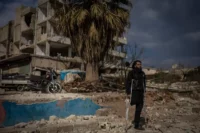
Esta fotografía exige una respuesta
Si no nos fijamos demasiado, podríamos pensar que la fotografía es una instantánea con poca luz de una pijamada o de un viaje familiar para acampar. Seis niños yacen, alineados, con la cabeza asomando de una sábana blanca que descansa despreocupadamente sobre sus pequeños torsos. Ninguno parece tener más de 10 años, aunque es difícil asegurarlo.
Al principio, quizá no reparemos en la mancha de sangre seca en la esquina superior derecha de la imagen. Pero luego lo hacemos, y entonces es imposible no ver que a una de las niñas, la segunda desde la izquierda, parece faltarle una parte de cráneo.… Seguir leyendo »






